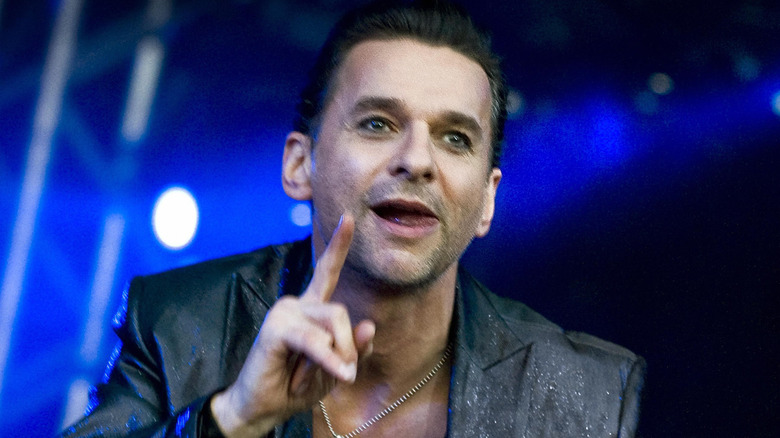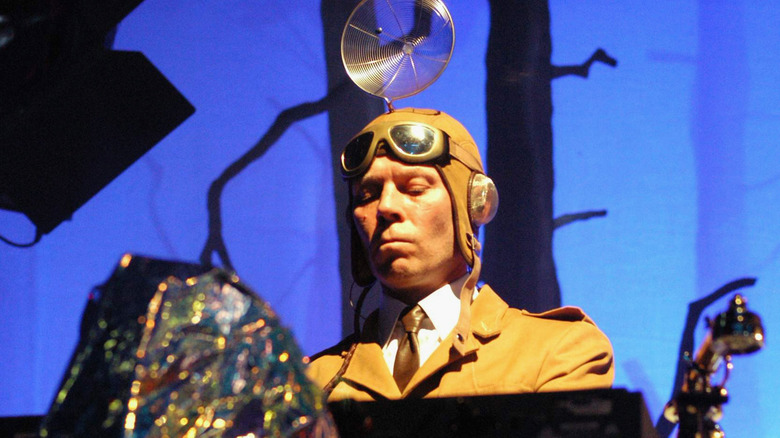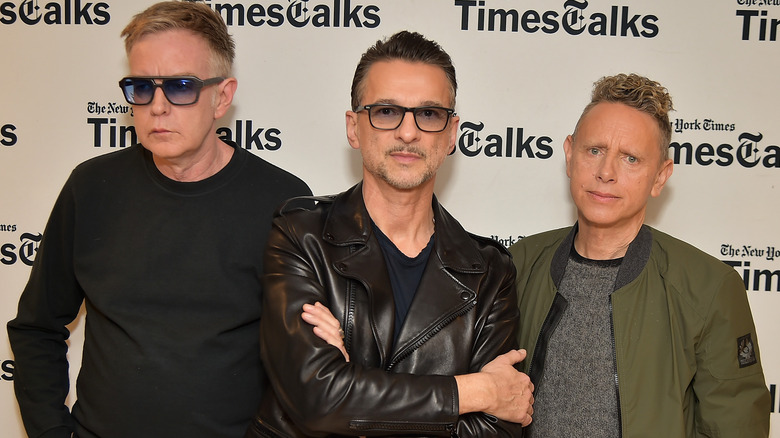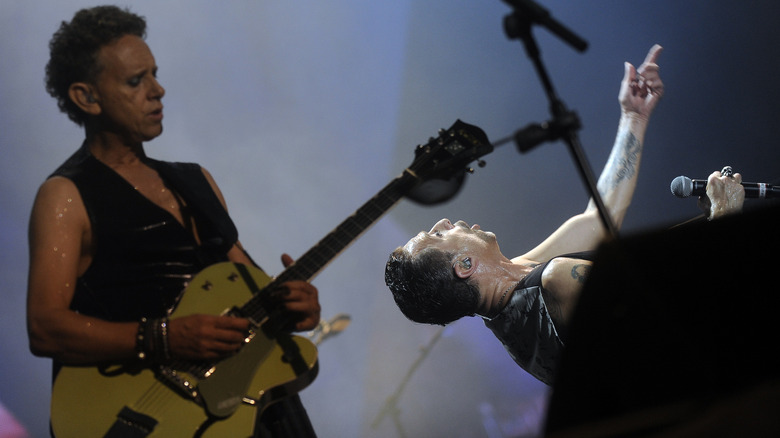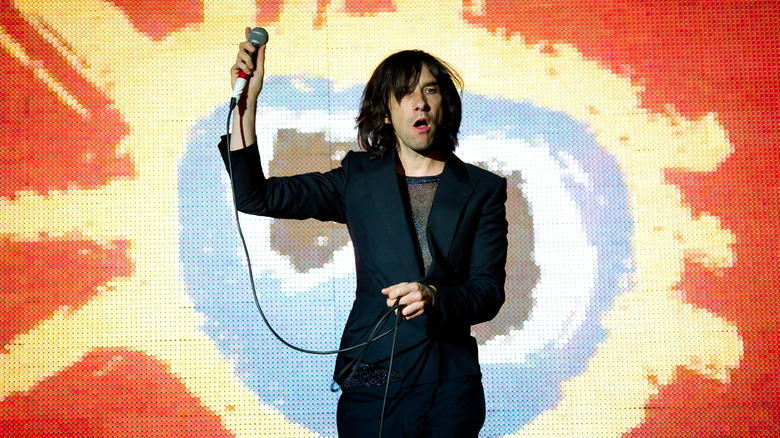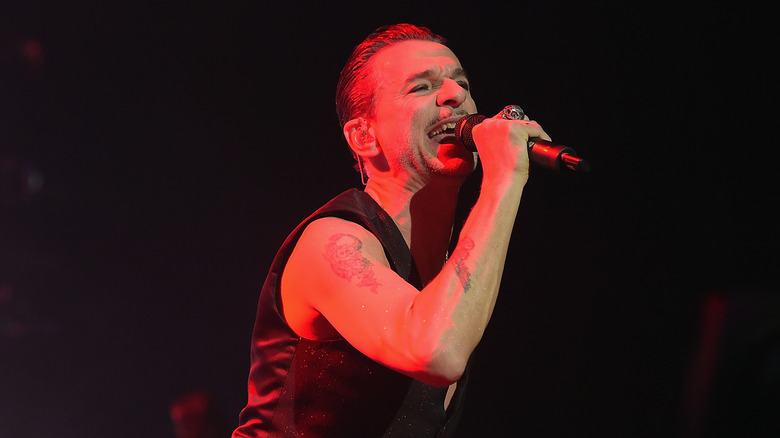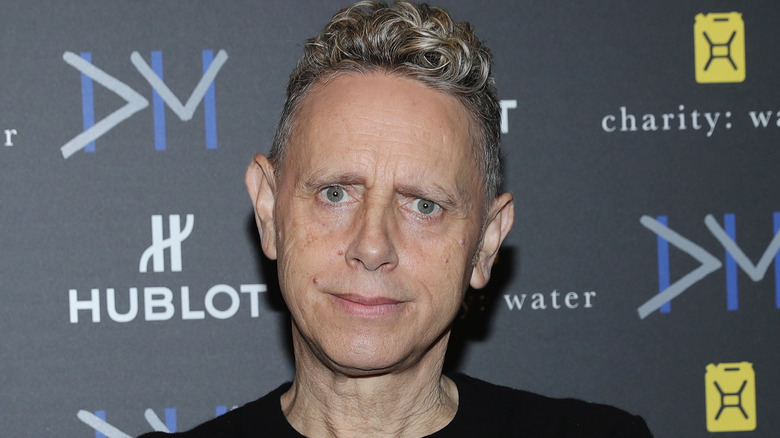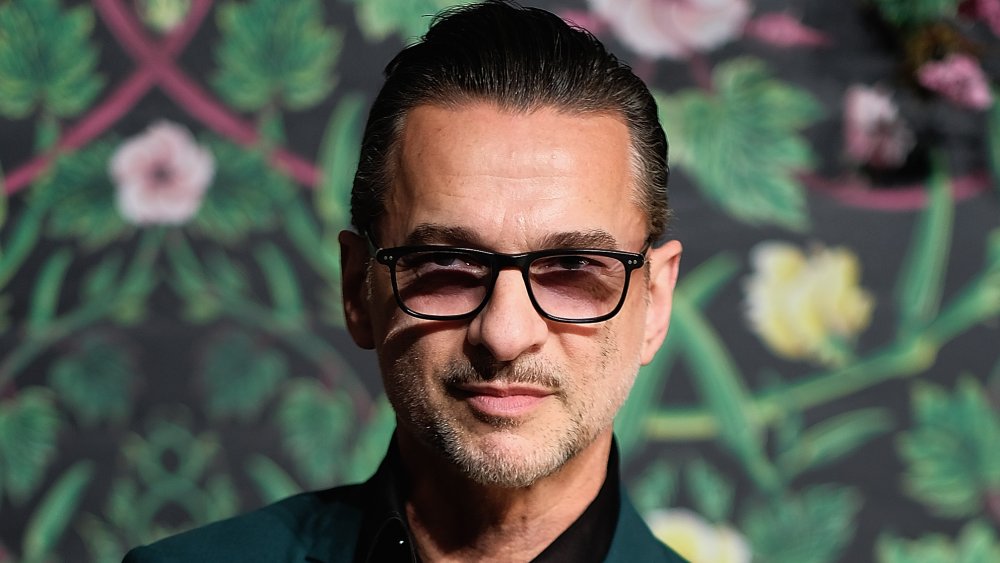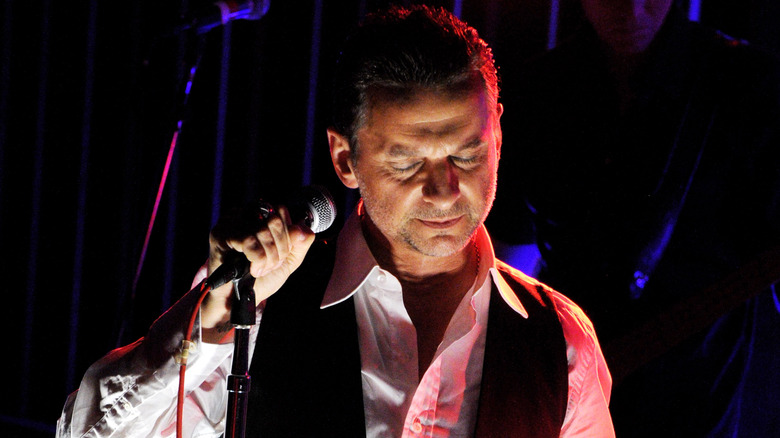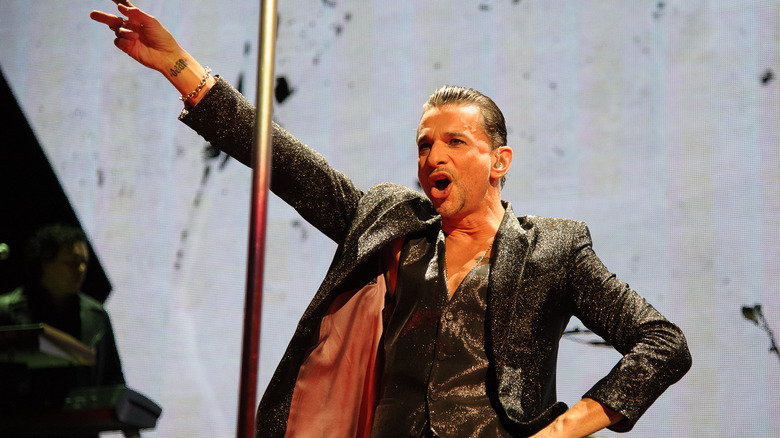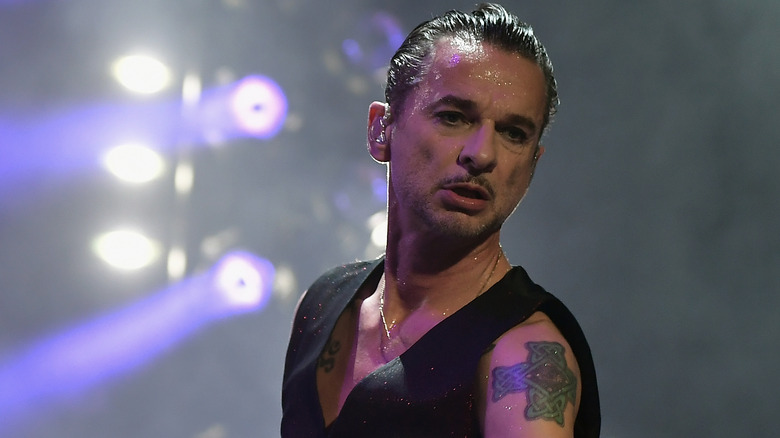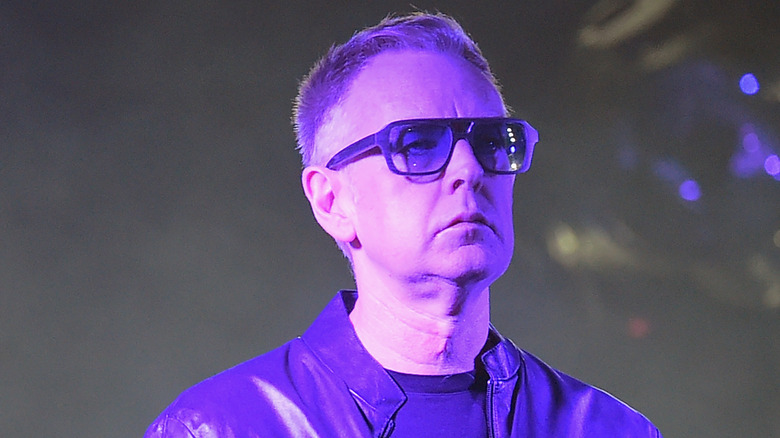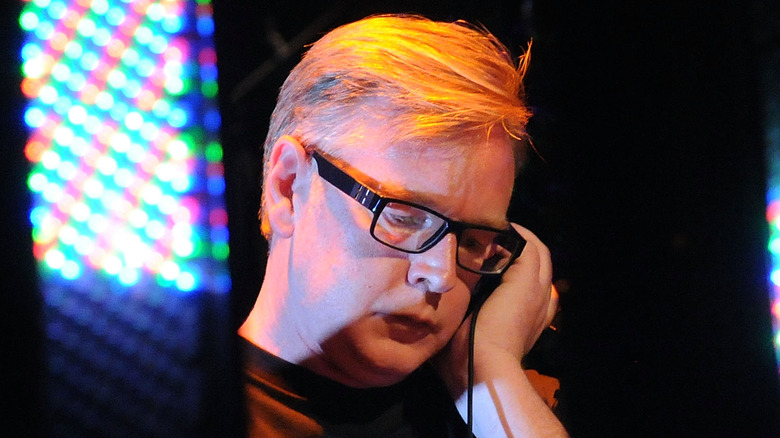The Tragic Real-Life Story Of Depeche Mode
Depeche Mode helped create what would become the sound of the 1980s — New Wave pop with mopey lyrics about guilt and anguish, but you could still to dance to it because of all the kicky keyboards and drum machines. Over time, Depeche Mode's sound evolved away from synth-driven stuff like "Just Can't Get Enough" and "People are People," and the British band helped usher in the alternative rock of the '90s via "Enjoy the Silence," "Personal Jesus," and "I Feel You."
Truly the band is responsible for one of the best team-ups in music history, combining the velvety and dignified voice of Dave Gahan singing romantic and inscrutable lyrics penned by Martin Gore. This dark and wonderful collective is now one of the longest-lasting bands of all time, with its core trio of Gahan, Gore, and Andy Fletcher making interesting and progressive music together for 40 years and seeing 100 million albums sold. However, despite all their success, it's remarkable Depeche Mode is still a band. The group has suffered quite a few setbacks and tragedies on their path to super stardom, and here's the shocking, harrowing, sad, and dangerous story of Depeche Mode.
Vince Clarke left the band immediately after Depeche Mode's first album
Depeche Mode is known for its distinctive sound — dark and electronic but velvety smooth, soulful, and hard-rocking when it isn't danceable. That's a style that came with time and evolution, as Depeche Mode's first album, 1981's "Speak & Spell," is straightforward synth pop, equal parts catchy and cold on memorable tunes like "Just Can't Get Enough" and "New Life." Probably the main reason "Speak & Spell" sounds so different from, say, "Enjoy the Silence" or "People are People" is because original member Vince Clarke wrote almost the entire thing.
However, almost immediately after the album hit stores, Clarke left Depeche Mode. He was certainly successful, as he formed two of the most influential and popular synth-pop acts ever in Yazoo (known as Yaz in the U.S.) and Erasure. But his departure from Depeche Mode right after it broke out threatened to destroy the band and everything its members had worked so hard to achieve. Fortunately, member Martin Gore stepped up to become the band's primary songwriter, and keyboardist Alan Wilder joined to fill Clarke's instrumental post.
The German media made up a lot of stories about Depeche Mode
Electronic music has historically fared very well in Germany. Synth-loving bands like Tangerine Dream, Rammstein, and Kraftwerk all got started there. So when Depeche Mode burst onto the scene in the early 1980s, audiences in West Germany thoroughly embraced the British group and its sound. According to the BBC, in 1984, Depeche Mode's "People are People" was used as the theme song for the TV coverage of the 1984 Summer Olympics in Germany, which propelled the song to the top of the pop charts there — the band's first No. 1 single anywhere.
Local music magazine Bravo (which also had a TV series) became particularly enamored with Depeche Mode, but because it couldn't get much access to interview lead singer Dave Gahan and company, the publication populated its pages with tales of the band that its writers simply made up. "The last time we refused an interview with them, they made up a story about Dave having to be carried off-stage at the end of every performance, taken to a separate dressing room and kept supplied with constant fluids," band member Andy Fletcher told NME (via BBC). "The time before that they said we hated everyone under 20."
Alan Wilder was almost killed by a plummeting plane
While not an original member of Depeche Mode, Alan Wilder (pictured left), who joined in 1982, was a vital part of the band during its creative and commercial heyday, playing on albums like "Music for the Masses," "Violator," and "Songs of Faith and Devotion" before leaving in 1995. But just before he left to pursue other musical projects, Wilder was involved in a plane crash ... but he wasn't actually on the plane.
According to a contemporary news report (via a website about Wilder's other band, Recoil), the musician was driving his convertible in the hills outside Lochearnhead, Scotland, on September 1, 1994. "As I approached a sharp bend in the road, the sound of the Tornado appeared behind me," Wilder said, referring to a Royal Air Force Tornado airplane, "and as I looked up, the underside of the aircraft was no more than 50 feet above me." Reportedly flying at about 400 miles per hour, the Tornado crashed into a hillside about 600 feet away from Wilder, leaving a large crater near the road. The musician heard the sound of the jet hitting land and then saw an explosion, sending smoke and debris into the air ... and into Wilder's open-roofed car. Chillingly, Wilder also recalls seeing human remains strewn about the road. He left when authorities arrived, and it was in that moment that Wilder "realized what an incredible escape" he'd made.
Depeche Mode scared another a band into sobriety
While never a hugely popular band in the U.S., Scottish alternative rock band Primal Scream did very good business in the U.K., running up a string of glam-inspired, lightly psychedelic, and danceable hits in the '90s like "Loaded," "Rocks," "Kowalski," and "Star." Associated with the dance music scene and the equally ecstasy-driven "Madchester" sound of bands like the Stone Roses and Happy Mondays, Primal Scream combined rock with grooves, much like Depeche Mode. And according to Uncut (via Webadelica), its members also did a copious amount of drugs ... just like the members of Depeche Mode.
Singer Dave Gahan worked hard to get Primal Scream a spot as his band's opening act on its American tour in 1994, impressed as he was by their then-new album "Give Out But Don't Give Up." "I wanted us to be able to swing like that and be that loose," Gahan said in Jonathan Miller's "Stripped: Depeche Mode." Primal Scream indeed joined the tour, but the group had a miserable time. According to a quoted feature from Q, the members of the band "were so shaken by Depeche Mode's level of excess" that they swore off the many drugs they'd previously used as musical inspiration and recorded their next album "with zero input of powder, pill, or spliff."
If you or anyone you know is struggling with addiction issues, help is available. Visit the Substance Abuse and Mental Health Services Administration website or contact SAMHSA's National Helpline at 1-800-662-HELP (4357).
Dave Gahan suffered a heart attack during a show
Depeche Mode played around the world throughout most of 1993 and 1994 on its "Devotional Tour" and its "Exotic Tour." However, the trip was seemingly cursed for singer Dave Gahan. During a show in Montreal, Gahan lost his voice while attempting to sing "Condemnation." (According to a source from the band's label, Warner Music, who spoke to Variety, Gahan had contracted "a bad cold.") Martin Gore stepped in to sing a few numbers, only for Gahan to briefly try once more before the band called it a night. Depeche Mode then canceled a show in Cincinnati after Gahan opened a beer bottle and cut up his hand so badly he couldn't hold a microphone. But the October 8, 1993 incident in New Orleans was easily the worst of all. According to Uncut, Gahan suffered a drug-related heart attack on stage. (While he was carried out on a stretcher, the rest of the band broke into the song "Death's Door.")
That Depeche Mode tour mercifully concluded with a show on July 8, 1994, in Indianapolis. At the end of the concert, Gahan leapt into the crowd ... and fell 12 feet into a bank of seats. Security guards dragged him out, and he was taken to a hospital and shortly thereafter released. A few days later, after another medical consultation, Gahan learned that he'd cracked two ribs and suffered some internal hemorrhaging.
Martin Gore has dealt with stress-related seizures and alcoholism
Depeche Mode's seemingly endless touring in 1993 and 1994 took its toll on Dave Gahan, but it also proved difficult and medically upsetting to bandmate Martin Gore. According to Alan Cross' "Depeche Mode: The Secret History," the band's main songwriter had suffered from panic attacks before, but they increased with alarming frequency while on the road. And then, during a business meeting in Los Angeles, he suffered a grand mal seizure. Gore was immediately hospitalized, and doctors attributed the event to his body and brain reacting against years of stress, drugs, and mass consumption of alcohol.
Gore long struggled with a dependency on alcohol. "I was a horrible alcoholic for years. I knew at quite a young age that I had an issue with drinking," he told The Guardian. He says he got away with it for years because "it's encouraged for rock stars to be out of control." However, he knew it had gotten out of hand when his regular breakfast consisted of two double vodkas. While he never missed a show due to his addiction, he kept drinking even after the alcohol-related seizure and ramped up his consumption while recording the 2005 album "Playing the Angel" while also going through a divorce. Gahan recalls Gore showing up for recording sessions "a little drunk," but after the album was completed, Gore sought treatment.
If you or anyone you know is struggling with addiction issues, help is available. Visit the Substance Abuse and Mental Health Services Administration website or contact SAMHSA's National Helpline at 1-800-662-HELP (4357).
Dave Gahan attempted suicide
In the early 1990s, Dave Gahan split up with his wife and married concert promoter Theresa Conway. According to The Independent, she was a heroin user, and before long, Gahan had taken up the drug, too. "We made a pact early on that I'd never use intravenously, but of course, being a junkie and a liar, it didn't take long." By the time Depeche Mode hit the road in 1993 behind "Songs of Faith and Devotion," Gahan had so ravaged his body with drugs that it affected his voice, and he needed cortisol shots daily to get himself performance ready.
Two years after that, Gahan was living in a house in Southern California, split up from Conway and alone except for his drug-induced paranoid dark fantasies. "Mostly it was my own shadows I was chatting around in that apartment," he said. In August 1995, according to the Los Angeles Times, while on the phone with his mother, he attempted suicide. Gahan was treated at Cedars-Sinai Medical Center after a couple of days and recovered at home. A few weeks later, Gahan told the Globe (via MTV News) that he hadn't set out to take his own life, that he was just extremely depressed. "I drank a bottle of wine and swallowed a handful of Valium. That combination is really stupid," he said.
If you or anyone you know is having suicidal thoughts, please call the National Suicide Prevention Lifeline at 1-800-273-TALK (8255).
Depeche Mode's lead singer overdosed on heroin
Dave Gahan spent most of the '90s in the grips of an overwhelming heroin addiction. According to NME, he tried to get sober, checking into a drug rehabilitation facility in Arizona at the end of 1994. Six weeks later, he was clean, but before long, he found himself using again "in secret," as Gahan puts it. He believes his continued use of drugs is what led to his wife leaving him. "She got sick and tired of picking me up off the floor, and she decided to split." That all sent Gahan over the edge and into a pattern of sobering up and using drugs again.
In May 1996, substances nearly killed the singer. While living in the Hollywood Sunset Marquis, he injected such a large combination of heroin and cocaine that he overdosed. He was technically dead for six minutes. "All I saw and all I felt at first was complete darkness," Gahan told Q. "I've never been in a space that was blacker, and I remember feeling that whatever it was I was doing, it was really wrong." After that, and at the urging of his bandmates, Gahan enrolled in the Exodus Recovery Center in Marina Del Rey, California, for another grueling stint at rehab. That time, he stayed drug-free.
If you or anyone you know is struggling with addiction issues, help is available. Visit the Substance Abuse and Mental Health Services Administration website or contact SAMHSA's National Helpline at 1-800-662-HELP (4357).
Dave Gahan developed bladder cancer
In 2009, 16 years after suffering a heart attack during a show in New Orleans, Dave Gahan didn't even make it onto the stage after a sudden medical emergency took him out of commission. Before a concert in Athens, Greece, just the second date of the planned year-long "Tour of the Universe," Gahan fell ill with some internal pain so severe he had to cancel that night's show and head to a local hospital. "At first they said it's a stomach virus. But this guy did ultrasound on me," Gahan told Q (via NME). "He looked at the screen and said, 'I can see something.'"
The medic then brought in a colleague who definitively told Gahan that he had a malignant tumor on his bladder — cancer, in other words. Gahan was scheduled for surgery the next day, and fortunately, the oncologist told him his prospects were good, as the tumor hadn't "broken through the wall" of the bladder. However, as recovered, per doctors' orders, the next dozen or so concerts were postponed or canceled.
Dave Gahan got hurt onstage a few times
Shockingly, Dave Gahan's bout with cancer (and subsequent emergency tumor removal surgery) wasn't the only bad thing that happened to Depeche Mode during its 2009 tour. After Gahan was well enough to head back out on the road, the band played the BBK Live Festival in Bilbao, Spain, on July 10. While singing, dancing, and darkly gallivanting about the stage, as he's wont to do, the 47-year-old singer somehow tore a calf muscle.
Just like after his cancer surgery a couple of months earlier, doctors told Gahan that he simply couldn't keep touring and that he'd have to stay off of his injured leg in order for it to heal properly. To give Gahan a break to cope with his break, Depeche Mode had no choice but to cancel its next two dates, the final two stops on the European leg — big shows at the Super Bock Super Rock Festival in Porto, Portugal, and at Olympic Stadium, in Sevilla, Spain.
Gahan's terrible, horrible, no good very bad 2009 wasn't over. In August, the singer injured his vocal cords, which makes performing big concerts next to impossible. Depeche Mode had to cancel two California concerts to provide Gahan with vocal rest.
Andy Fletcher of Depeche Mode dealt with mental health issues
The long, grueling, nearly-200 date 1993 "Devotional Tour" (and the 1994 "Exotic Tour" extension) was Depeche Mode's biggest ever, but it threatened to destroy the band — both as a musical-making entity and as healthy human beings. According to The Independent, core members Dave Gahan, Martin Gore, and Andrew Fletcher were barely speaking to each other during this time. And while Dave Gahan and Martin Gore suffered numerous medical setbacks both big and small, bandmate Andy Fletcher's mental health deteriorated.
The personal tensions and being on the road almost nonstop for over a year was too much for Fletcher to bear, as was the death of his sister from stomach cancer (according to Alan Cross's "Depeche Mode: The Secret History"), and he could no longer manage his anxiety issues. Fletcher eventually checked himself into a hospital in England. (His absence on tour dates was explained as his need to attend to the band's business affairs). "It's so long ago, and we were very different people then. It was a small period of our lives," Fletcher said of that tour and its events to The Irish Times in 2009. "But we got over it."
If you or someone you know is struggling with mental health, please contact the Crisis Text Line by texting HOME to 741741, call the National Alliance on Mental Illness helpline at 1-800-950-NAMI (6264), or visit the National Institute of Mental Health website.
Andy Fletcher died
While the members of Depeche Mode would barely survive several brushes with death over the years, only voluntary exits would depopulate the band that has soldiered on for more than 40 years and was inducted into the Rock and Roll Hall of Fame. For more than two decades, the band had functioned as a trio, but in 2022, the group suffered a profound and immeasurable loss when founding member, utilitarian musician, bassist, and synths player, Andy Fletcher died unexpectedly. "We are shocked and filled with overwhelming sadness with the untimely passing of our dear friend, family member, and bandmate Andy 'Fletch' Fletcher," the surviving members of Depeche Mode wrote in a statement posted to its Twitter account. "Fletch had a true heart of gold and was always there when you needed support, a lively conversation, a good laugh, or a cold pint."
An unnamed Depeche Mode insider told the Associated Press (via NPR) that Fletcher died at his home in the U.K. of natural causes. He was 60 years old.
